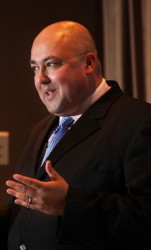Roughly a dozen years into its history, Google has become “the lens through which we investigate the world,” said cultural historian and media scholar Siva Vaidhyanathan. But can we trust the results of a Google search to be neutral, and is our blind faith in the search engine behemoth even healthy?
Vaidhyanathan, professor of media studies at the University of Virginia, spoke on “The Googlization of Everything (And Why We Should Worry)” at the First Amendment Center April 8. His talk was the spring 2011 Curb Creative Leadership Lecture sponsored by The Curb Center for Art, Enterprise and Public Policy at Vanderbilt.
Google’s official mission statement is “To organize the world’s information and make it universally accessible.” When once asked how the search engine would function, Google co-founder Sergey Brin said, “It would be like the mind of God.” Vaidhyanathan says that such audacious statements beg for critique.
“We grant Google an almost mystical role in our lives, yet we don’t know how it really works,” he said. “The naive vision that a company can do no wrong is unhealthy.”
One of the reasons users are so trusting is that “Google never asks us to pay anything,”

Vaidhyanathan said. The search engine, the popular Gmail and other services are free. Yet we pay in other ways, he said – namely through Google’s ability to track and personalize our searches.
“We are the product that Google sells to advertisers,” he said, noting that the related ads appearing on a page are nearly indistinguishable from the actual search results. When users click through these ads, Google makes a profit.
“We’re also Google’s worker bees – we’re making Google smarter each time we search through its ability to personalize our preferences and information,” he said.
Google uses a link analysis algorithm to determine how search results appear on the page. But this isn’t an unbiased ranking of information, Vaidhyanathan said.
“No algorithm is neutral,” he said. “When you write an algorithm, you embed your values in it.”
For example, highly organized groups of people who want to impose an agenda can coordinate their actions to elevate search results. This practice, called “Google bombing,” can create a false sense of what information is important. Google is constantly altering its PageRank system to combat this, which in itself imposes values on the system.
Google is changing to produce results that are more personalized, more localized and improve user satisfaction. The goal is results that are faster, in greater quantity and as current as possible, Vaidhyanathan said. All of this is making the search engine “better for shopping, but not necessarily better for learning.”
Vaidhyanathan readily admits to using Google “every day in multiple ways,” but that it’s probably best to do so with a healthy measure of caution.
The good news is “the Web is not the world – the world is actually better than the Web.” A better approach to doing research would be to reignite our passion for libraries, he said.
“Libraries are where real human beings work through things openly and explicitly,” Vaidhyanathan said. “There’s nothing civil about experiencing the world through Google, because it’s all about the quick fix.
“The worst thing you could do is to stop searching there.”